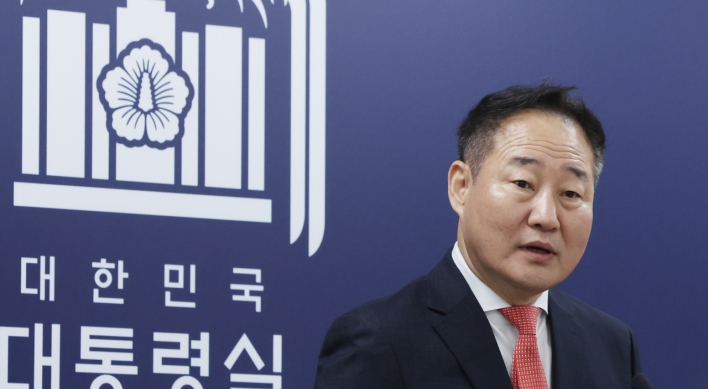Envoys commemorate 60 years of Korean peace at Buddhist reception
By Korea HeraldPublished : May 12, 2013 - 20:21
A coterie of foreign envoys commemorated on Wednesday the armistice agreement that ended fighting in the Korea War 60 years ago with National Assembly representatives, officials from the Ministry of Foreign Affairs and other dignitaries at a Buddhist temple nestled in the foothills of Bukhansan Mountain.
The Jogye Order of Korean Buddhism hosted the special reception at Jinkwansa Temple for foreign ambassadors, including envoys of the 21 nations that fought for South Korea against the 1950 invasion from North Korea. Three years of warfare followed, and millions were killed.
The Jogye Order of Korean Buddhism hosted the special reception at Jinkwansa Temple for foreign ambassadors, including envoys of the 21 nations that fought for South Korea against the 1950 invasion from North Korea. Three years of warfare followed, and millions were killed.

Dubbed the “Korean Peninsula Peace Festival,” Wednesday’s reception was part of eight months of events planned through September to commemorate the 60th anniversary of the armistice agreement signed by North Korea, China and the United States.
South Korea is not a signatory to the cease-fire agreement.
British Ambassador to Korea Scott Wightman led envoys representing the 21 nations that sent troops to South Korea in the three-year war. The foreign diplomatic community was represented at the reception broadly, with ambassadors in attendance from Italy, Germany, Austria, Poland, Ireland, Ukraine, Pakistan, Bulgaria, Sri Lanka, India and Mongolia.
“It is very important and an honor, really, to be a part of this ceremony because, as you know, British soldiers were strongly involved in the Korean War,” Wightman said after a Buddhist ceremony. “This ceremony commemorates the armistice and contributes to the process of peace for the future of the Korean Peninsula.”
The Jogye Order organized the Korean Peninsula Peace Festival to foster inter-Korean reconciliation, build a hopeful Korean future and express condolences to all those who died during the Korean War including North Koreans and Chinese, according to the reception’s program.
“Through the Buddhist ceremony we can recognize that peace goes beyond a single religion and a single ethnicity and even goes beyond the Asian region to include all parts of the world,” said Italian Ambassador to Korea Sergio Mercuri.
The reception for envoys of the United Nations member countries which fought together in the Korean War was especially unique for Irish Ambassador to Korea Eamonn McKee because, while the Irish government did not dispatch its troops to South Korea, people from Ireland sacrificed their lives fighting in the armies of other nations for the South.
“It stems from the recognition of the participation of soldiers from Ireland who fought in the war as British or American soldiers,” said McKee.
The peace festival culminates with a ceremony at the U.N. Memorial Cemetery and an open concert on Sep. 27.
By Philip Iglauer (ephilip2011@heraldcorp.com)
-
Articles by Korea Herald





![[K-pop’s dilemma] Can K-pop break free from ‘fandom’ model?](http://res.heraldm.com/phpwas/restmb_idxmake.php?idx=644&simg=/content/image/2024/05/09/20240509050541_0.jpg&u=20240509173751)




![[News Analysis] Yoon's first 2 years marked by intense confrontations, lack of leadership](http://res.heraldm.com/phpwas/restmb_idxmake.php?idx=644&simg=/content/image/2024/05/09/20240509050612_0.jpg&u=20240509233252)








![[Today’s K-pop] NCT’s Mark to drop 1st solo album in February 2025](http://res.heraldm.com/phpwas/restmb_idxmake.php?idx=642&simg=/content/image/2024/05/10/20240510050597_0.jpg&u=)